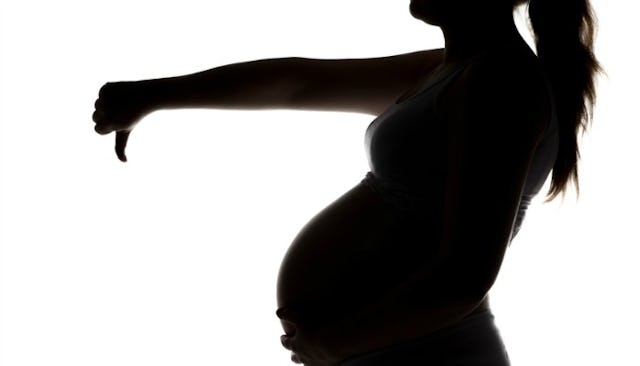Dealing With Depression And Anxiety During Pregnancy

“I’m not even excited to be a mom anymore,” I whispered to the doctor as tears flowed over the dark heavy bags under my eyes. “I just want to be done.” I couldn’t even look at my husband because of the huge amount of shame that I felt for saying these horrible words. I still feel guilty even typing them today.
My postpartum depression began in the last trimester of my first pregnancy. In the last month, I was not sleeping. I was up six to eight times a night to use the restroom, without any exaggeration. I had horrible back pain, and my hands and feet were swollen to an unrecognizable state. But I would say worse than all of that combined was my minute-by-minute struggle with extreme anxiety during pregnancy.
There’s nothing like counting down the weeks to make an anxious person even more anxious. The second I found out I was pregnant, I signed up for the weekly updates. I got on social media and would search the hashtag for my week. #12weeks… #25weeks… My life was now 100% a waiting game — and not in any fun, enjoyable way for me.
I have lived with anxiety my entire life. Some points in my life have been easier to deal with it, and some harder. But I can say my pregnancies and postpartum months were the most trying of my life. Due to my anxiety, I live my life in “worst-case scenarios.” I am always worried about the tragedies and life-altering events that “someday, maybe, could possibly” happen. In the early stages of my pregnancy, I worried constantly about having a miscarriage. I was a twin and my mother miscarried my sister at 20 weeks. So for me, the 20-week mark was a huge milestone.
After I got to 20 weeks, I began obsessing over labor and delivery. I spoke to my doctor about my anxiety at one of my first appointments. My first OB doctor was an older gentleman who had been delivering babies for a very long time. We chose him as my doctor for that very reason.
When I mentioned my anxiety and the fact that I was worried about being pregnant with anxiety his response was, “Just don’t worry so much about burning the mashed potatoes!” I was actually really hurt by his response. I was bringing this up to him because I was truly concerned, and it seemed like he didn’t really understand anxiety. We later changed doctors after we had our anatomy ultrasound and he mentioned, as a side note, at the very end of the appointment that our son had a two-vessel umbilical cord but “don’t Google it because you will just read horror stories.”
In case any doctors are reading this, do not tell a mother not to Google something, and especially don’t tell a mother with anxiety not to Google something.
I hated being pregnant. Some people will think I am cold and heartless for saying that, I’m sure, but it is the truth. I had lived my life with this crazy illusion that when you were pregnant you got to eat whatever you wanted all day and you didn’t have to work — neither of which were true for me. The doctor actually had me watching my weight due to unhealthy weight gain, and I worked full-time up until the day before I went in to be induced. The worst part about it was that every time I complained, people would say, “It will all be worth it when you hold your sweet baby boy.”
Really…will it?
That is what brought me to the conversation with my doctor about not wanting to be a mother anymore. I was at 38 weeks and had reached my absolute breaking point. He, of course, asked me if I planned to hurt myself or anyone else (no) and then he insisted that I get on some sleeping medication. I fought him hard because I hadn’t taken any medication since becoming pregnant, but he said he thought it was best that I get some sleep.
Growing human beings is a miracle. For me, it was a horrible, uncomfortable, anxiety-provoking miracle that I honestly never thought I would be able to go through again. But I really want mamas to understand that it is OK to feel this way. It is OK to not experience the beautiful side of pregnancy. I am not wishing difficult pregnancies — mentally or physically — on anyone. But I believe that women sometimes feel like we have to lie about the experience because we feel like being honest would be a disservice to our gender, or to our babies. I think everyone would benefit from a more open and honest dialogue regarding pregnancy, and specifically anxiety and depression during pregnancy and postpartum. The more we discuss the issues, the less stigma will be associated with them.
If you think you might be suffering from PPD, or need some extra support, visit www.postpartumprogress.com.This post originally appeared on Her View From Home.